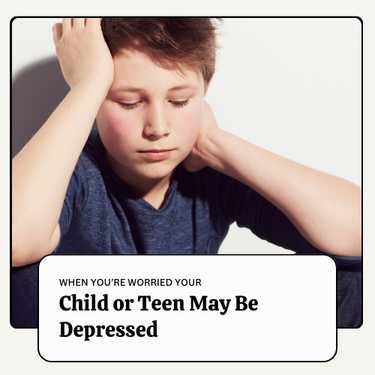
Child and teen depression is one of the most serious mental health problems kids and teens can encounter. Youth ages 12-17 are the age demographic most at risk for suffering from major depression, and it is estimated that nearly 15% of teenagers will experience depression. The teenage years are a transformational time for a young adult, and the changes are not always easy. Academic pressure, social dynamics, and the reacclimating to puberty can completely shift how your teenage child thinks, feels, acts, and behaves.
What causes child or teen depression?
There are many factors that influence the development of teenage depression such as bullying, lack of emotional support, social exclusion, mental or physical health, environmental stressors, and genetics. Untreated teenage depression can continue into adulthood and can be life-threatening, increasing the chances of suicidal behavior, if the young person feels helpless and hopeless. If you suspect that your child or teen may have depression, do not shame or minimize their behavior or feelings or hope it just goes away. Instead, trust your instincts and reach out in a loving, non-judgmental way to offer support.
Teenage depression is not a moral failure, a sign of weakness, or even a choice, which means that willpower alone will not be enough for overcoming depression. Psychological talk therapy or counseling, positive social involvement, and medication are proven solutions for overcoming and preventing the serious, long-term, and life-threatening consequences of teen depression.
The Signs And Symptoms Of Teenage Depression That Are Unique To Teens
Teen depression is different than adult depression, and the symptoms can vary greatly. Keep alert to your teen’s emotional changes and reach out to them often. Never punish a troubled teen for sharing disturbing information as this will only prevent them from sharing information with you in the future. If your child or teen starts consistently exhibiting some of the below behavior, seek help immediately:
It is important to remember that melancholy or sadness is not the same as depression. Part of being a teenager includes emotional growing pains, social stressors, and hormones. While it is normal for your teen to experience some highs and lows, depression is characterized as persistently negative. Consider the duration and severity of the symptoms your troubled teen might be exhibiting, and if the symptoms are becoming the new baseline of behavior, seek help immediately.
The Link Between Depression And Anxiety
Depression and anxiety often occur simultaneously and many of the symptoms overlap. While both depression and anxiety are distinctly different, they can be experienced simultaneously and work together to perpetuate a damaging cycle. Anxiety and depression trigger the other, and over 50% of people with depression also suffer from severe anxiety. The reverse is also true, and depression is often the byproduct of an anxiety issue left untreated.
Don’t Wait – Seek Professional Help For Your Adolescent
Staying closely connected to your child or adolescent’s emotional needs in a non-judgmental way is very important for their recovery and immediate safety. If your troubled teen’s words or actions indicate that they feel unable to manage their emotions or if the ups and downs of their life feel overwhelming to them to the point where their day-to-day life is interrupted with depression and/or anxiety symptoms, then professional support is needed. Your family doctor or your child’s school counselor may recommend a mental health professional. You can also search for a qualified therapist using our provider directory at www.KIDStherapyfinder.com.
Know The Warning Signs Of Teen Suicide And Be Ready To Act
Depression and anxiety rarely ever improve on their own, and willpower and forced positivity is not enough for overcoming depression. Even if symptoms do not at first appear to be severe, emotions can quickly snowball, and depressed teens are way more likely than depressed adults to believe that the mental pain they are feeling is permanent.
If you believe that suicide is a risk factor for your troubled teen, then act immediately! Teenage suicide is a real concern, and parents are in the best position to help prevent it. Become an expert in teen suicide prevention by knowing how to identify the warning signs of suicide and how to respond in the moment to save a life. The National Suicide Prevention Lifeline is available 24/7 all 365 days of the year at 1-800-273-TALK. If you are located outside the United States, visit IASP or Suicide.org.
Do you need support?
Does your child seem depressed? Unsure of what to do or looking for help? You don’t have to do this alone! Schedule a consultation to learn more about mental health services with a KIDStherapyfinder.com therapist.

Sign up for our newsletter to get instant access to parenting resources sent directly in your inbox!
